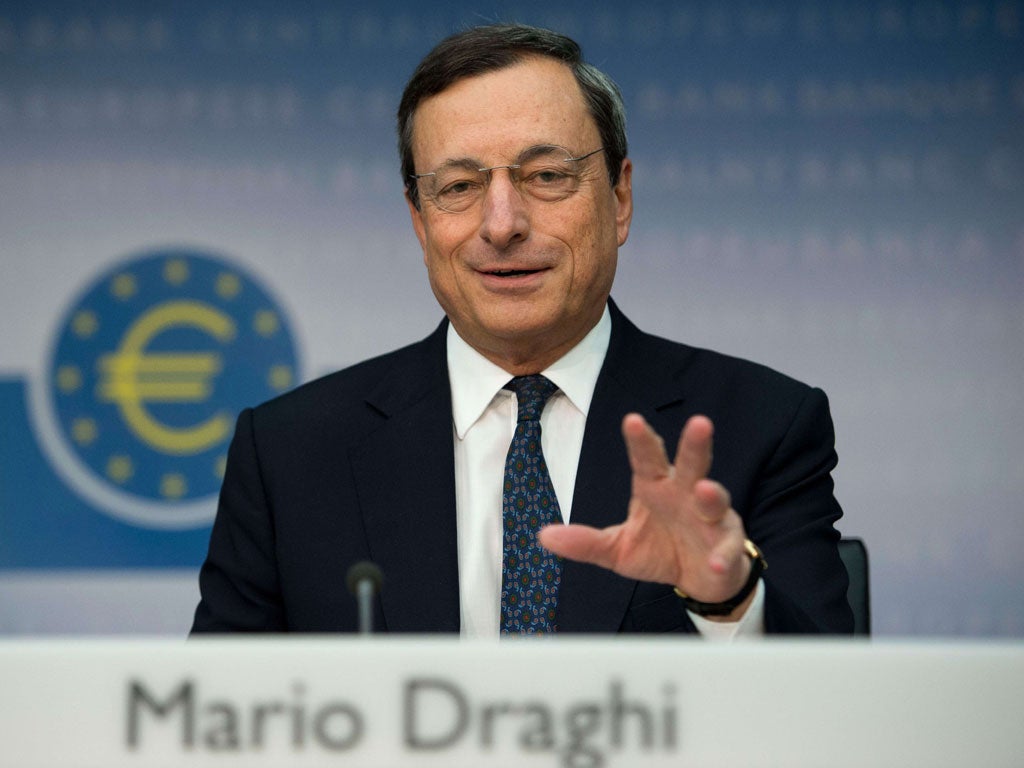Grand plan to save euro wins over Merkel and markets
ECB chief says new bond-buying scheme is a 'fully effective backstop' against further chaos

Mario Draghi, the head of the European Central Bank, brandished the most potent weapon in his policy arsenal yesterday, unveiling an aggressive plan to buy up the bonds of struggling governments in an attempt to save the euro.
Against the backdrop of yet more terrible economic news, Mr Draghi lived up to the "Super Mario" moniker bestowed upon him by market watchers with a promise to place "a fully effective backstop to prevent destructive scenarios". Despite its travails, the euro, he said, was "irreversible".
In a widely expected move, the ECB confirmed that it is now available to buy short-term government debt, in a process called outright monetary transaction. The scheme is designed to help member states that have been paying too much to borrow to force down their costs.
If it works, it should allow members to borrow at a reasonable cost while they get their fiscal houses in order. The ECB chief said that the bond-buying programme could be unlimited in size – although restricted to a three-year duration – which means the biggest of bazookas is potentially being brought to bear on the eurozone debt crisis.
The spectre of default and break-up of the single currency still looms large, however, as political leaders struggle to come up with a longer-term answer to the currency bloc's woes.
But Mr Draghi, who remains under pressure from the German Bundesbank to limit the ECB's intervention in the markets, made clear that the scheme would not be a free lunch for the weaker countries, such as Spain and Italy.
Member states will be expected to continue "fiscal consolidation and reforms to enhance competitiveness", he warned, setting the stage for a continuation of the spending cuts that have sparked discontent on the streets of Athens and Madrid.
In addition, countries asking the ECB for help will also need to have applied to the EU's bailout schemes and accepted the intervention of the International Monetary Fund. Countries seeking the central bank's aid will have to be in "adjustment measures" – which in effect spells more austerity, something the indignados on the streets of Spain or members of Italy's fractured political class are going to find hard to swallow, not least after seeing the fallout of such intervention in Greece.
Shortly after Mr Draghi's announcement, the German Chancellor, Angela Merkel, who was meeting the Spanish Prime Minister, Mariano Rajoy, yesterday, defended the ECB from its critics, the most vocal of whom hail from her own country. Answering the charge that the central bank was going too far with the new measures, she said: "The ECB is acting independently within [its] mandate framework."
Reaction from the equity markets was initially muted, with much of the detail expected by traders, but turned positive as the day progressed, with European indices booking strong gains. More importantly, government borrowing costs for three of the eurozone's weakest members – Portugal, Italy and Spain – fell after the ECB announcement, suggesting traders were becoming less fearful of a calamitous sovereign default.
Concerns remain, however, about the response of Spain once Ms Merkel jets back to Germany.
"IMF involvement sought in monitoring/setting conditions for ECB bond market intervention [is] possibly a bitter pill to swallow for Spain given Mr Rajoy has made it clear the country already meets the necessary conditions," said Richard McGuire, a rates strategist at Rabobank.
The unveiling of the ECB's plan couldn't have come a moment too soon for confidence in the economies of the eurozone. The OECD cut its growth forecasts for the bloc, predicting that France's economy will grow by a paltry 0.1 per cent this year, down from the 0.6 per cent forecast in May.
Germany, meanwhile, is expected to post a moribund 0.8 per cent, down from the 1.2 predicted, while Italy, which is likely to be one of the key beneficiaries of the ECB's bond-buying plan, is predicted to see a painful economic contraction of 2.4 per cent, 0.7 points worse than predicted in May.
Take note: Greece isn't going yet...
Is the ECB sending out a message with its new bank notes? The main motif on the updated euro notes, which are due to be unveiled in November, is the rape of Europa, the princess who lent her name to the continent, by the king of the Greek gods, Zeus.
Meanwhile those who are in two minds about the currency's future might note the timing: not expected to enter circulation until May 2013, the new notes suggest that the ECB, at least, is optimistic about the euro's (and Greece's) prospects.
Michael Day
Join our commenting forum
Join thought-provoking conversations, follow other Independent readers and see their replies
Comments
Bookmark popover
Removed from bookmarks